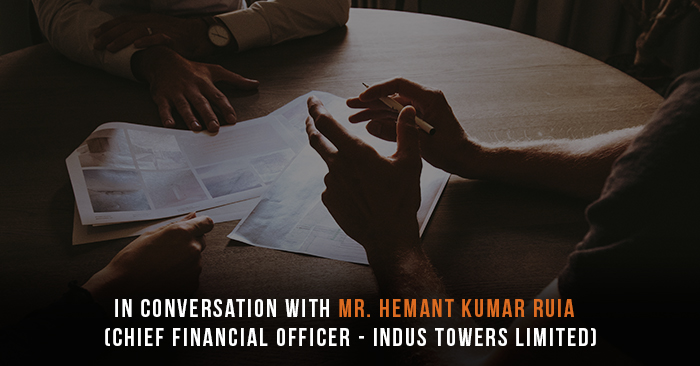Hemant is the Chief Financial Officer (CFO) at Indus Towers Limited. He is a Chartered Accountant, a Cost Accountant and a Chartered Financial Analyst and brings with him over 23 years of diverse experience across industries in various coveted organizations.
He has played key roles in financial management positions in several top tier organizations across india and is an expert in Business Partnering, Funds Management, Information Systems, Legal and Secretarial and other aspects of leading the Finance function.Hemant is also the winner of the ‘Top 100 CFO Award’ for four consecutive years from 2013 to 2016 as well as the ‘CIO & Leader Business Impact’ Award for 2015.
Here’s a peek into his insights being a CFO based on a couple of questions we asked.
1) When you realize that a major change has to be made in the organization, how do you deal with your executive board?
Any change is only successful if it is pre soaked and has buyin from all stakeholders. Hence, what I do is to request for a meeting and explain the problem, probable suggestions, zero down to on solution, and get a spoc from others to help implement the same. On this basis a project team is made which then implements the POA. Training and communication is then given extra focus.
2) With the talent shortfalls lately, happening due to various reasons, should Indian companies focus on building, acquiring or renting talent?
I focus on all three
- Building should be done when the gap is minimal and can be bridged with minimum intervention.
- Acquiring should be done when the gap is huge and the gap should be bridged to enable sustenance for the company. In such cases, talent should be acquired.
- I would advocate renting when the gap is temporary and needs to be filled for a short term.
3) What do you think is the role of The CFO as the protector and trustee of the organization against white collar crimes?
There are no two ways about it. The CFO must put in processes which are real time to ensure that as far as practically possible, all frauds are picked by the system. It is best if we monitor real time through systemic solutions rather than manual solutions to make this effective and sustainable.
4) If you reflect back on your first couple of years as a CFO, what would you do differently?
There is no end to training and communication while driving change. I would see how I could beef this up more.


